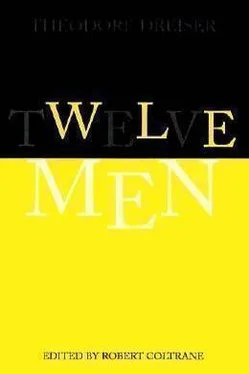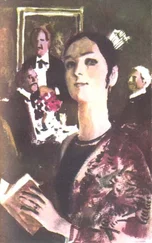Теодор Драйзер - Twelve Men
Здесь есть возможность читать онлайн «Теодор Драйзер - Twelve Men» весь текст электронной книги совершенно бесплатно (целиком полную версию без сокращений). В некоторых случаях можно слушать аудио, скачать через торрент в формате fb2 и присутствует краткое содержание. Год выпуска: 2014, Издательство: epubBooks Classics, Жанр: Биографии и Мемуары, на английском языке. Описание произведения, (предисловие) а так же отзывы посетителей доступны на портале библиотеки ЛибКат.
- Название:Twelve Men
- Автор:
- Издательство:epubBooks Classics
- Жанр:
- Год:2014
- ISBN:нет данных
- Рейтинг книги:4 / 5. Голосов: 1
-
Избранное:Добавить в избранное
- Отзывы:
-
Ваша оценка:
- 80
- 1
- 2
- 3
- 4
- 5
Twelve Men: краткое содержание, описание и аннотация
Предлагаем к чтению аннотацию, описание, краткое содержание или предисловие (зависит от того, что написал сам автор книги «Twelve Men»). Если вы не нашли необходимую информацию о книге — напишите в комментариях, мы постараемся отыскать её.
Twelve Men — читать онлайн бесплатно полную книгу (весь текст) целиком
Ниже представлен текст книги, разбитый по страницам. Система сохранения места последней прочитанной страницы, позволяет с удобством читать онлайн бесплатно книгу «Twelve Men», без необходимости каждый раз заново искать на чём Вы остановились. Поставьте закладку, и сможете в любой момент перейти на страницу, на которой закончили чтение.
Интервал:
Закладка:
"I know well enough that promises are all right," he said to one of his friends, "and that these laws are good enough excuses, but the public won't take excuses from me for three years. If I want to be mayor again I want to be doing something, and doing it quick."
In the city was a gas corporation, originally capitalized at $45,000, and subsequently increased to $75,000, which was earning that year the actual sum of $58,000 over and above all expenses. It was getting ready to inflate the capitalization, as usual, and water its stock to the extent of $500,000, when it occurred to the mayor that if the corporation was making such enormous profits out of a $75,000 investment as to be able to offer to pay six per cent on $500,000 to investors, and put the money it would get for such stocks into its pocket, perhaps it could reduce the price of gas from one dollar and nineteen cents to a more reasonable figure. There was the three years' voting law, however, behind which, as behind an entrenchment, the very luxurious corporation lay comfortable and indifferent.
The mayor sent for his corporation counsel, and studied gas law for awhile. He found that at the State capital there was a State board, or commission, which had been created to look after gas companies in general, and to hear the complaints of municipalities which considered themselves unjustly treated.
"This is the thing for me," he said.
Lacking the municipal authority himself, he decided to present the facts in the case and appeal to this commission for a reduction of the gas rate.
When he came to talk about it he found that the opposition he would generate would be something much more than local. Back of the local reduction idea was the whole system of extortionate gas rates of the State and of the nation; hundreds of fat, luxurious gas corporations whose dividends would be threatened by any agitation on this question.
"You mean to proceed with this scheme of yours?" asked a prominent member of the local bar who called one morning to interview him. "I represent the gentlemen who are interested in our local gas company."
"I certainly do," replied the mayor.
"Well," replied the uncredentialed representative of private interests, after expostulating a long time and offering various "reasons" why it would be more profitable and politically advantageous for the new mayor not to proceed, "I've said all I can say. Now I want to tell you that you are going up against a combination that will be your ruin. You're not dealing with this town now; you're dealing with the State, the whole nation. These corporations can't afford to let you win, and they won't. You're not the one to do it; you're not big enough."
The mayor smiled and replied that of course he could not say as to that.
The lawyer went away, and that next day the mayor had his legal counsel look up the annual reports of the company for the consecutive years of its existence, as well as a bulletin issued by a firm of brokers, into whose hands the matter of selling a vast amount of watered stock it proposed to issue had been placed. He also sent for a gas expert and set him to figuring out a case for the people.
It was found by this gentleman that since the company was first organized it had paid dividends on its capital stock at the rate of ten per cent per annum, for the first thirty years; had made vast improvements in the last ten, and notwithstanding this fact, had paid twenty per cent, and even twenty–five per cent per annum in dividends. All the details of cost and expenditure were figured out, and then the mayor with his counsel took the train for the State capitol.
Never was there more excitement in political circles than when this young representative of no important political organization whatsoever arrived at the State capitol and walked, at the appointed time, into the private audience room of the commission. Every gas company, as well as every newspaper and every other representative of the people, had curiously enough become interested in the fight he was making, and there was a band of reporters at the hotel where he was stopping, as well as in the commission chambers in the State capitol where the hearing was to be. They wanted to know about him—why he was doing this, whether it wasn't a "strike" or the work of some rival corporation. The fact that he might foolishly be sincere was hard to believe.
"Gentlemen," said the mayor, as he took his stand in front of an august array of legal talent which was waiting to pick his argument to pieces in the commission chambers at the capitol, "I miscalculated but one thing in this case which I am about to lay before you, and that is the extent of public interest. I came here prepared to make a private argument, but now I want to ask the privilege of making it public. I see the public itself is interested, or should be. I will ask leave to postpone my argument until the day after tomorrow."
There was considerable hemming and hawing over this, since from the point of view of the corporation it was most undesirable, but the commission was practically powerless to do aught but grant his request. And meanwhile the interest created by the newspapers added power to his cause. Hunting up the several representatives and senators from his district, he compelled them to take cognizance of the cause for which he was battling, and when the morning of the public hearing arrived a large audience was assembled in the chamber of representatives.
When the final moment arrived the young mayor came forward, and after making a very simple statement of the cause which led him to request a public hearing and the local condition which he considered unfair begged leave to introduce an expert, a national examiner of gas plants and lighting facilities, for whom he had sent, and whose twenty years of experience in this line had enabled him to prepare a paper on the condition of the gas–payers in the mayor's city.
The commission was not a little surprised by this, but signified its willingness to hear the expert as counsel for the city, and as his statement was read a very clear light was thrown upon the situation.
Counsel for the various gas corporations interrupted freely. The mayor himself was constantly drawn into the argument, but his replies were so simple and convincing that there was not much satisfaction to be had in stirring him. Instead, the various counsel took refuge in long–winded discussions about the methods of conducting gas plants in other cities, the cost of machinery, labor and the like, which took days and days, and threatened to extend into weeks. The astounding facts concerning large profits and the present intentions of not only this but every other company in the State could not be dismissed. In fact the revelation of huge corporation profits everywhere became so disturbing that after the committee had considered and re–considered, it finally, when threatened with political extermination, voted to reduce the price of gas to eighty cents.
It is needless to suggest the local influence of this decision. When the mayor came home he received an ovation, and that at the hands of many of the people who had once been so fearful of him, but he knew that this enthusiasm would not last long. Many disgruntled elements were warring against him, and others were being more and more stirred up. His home life was looked into as well as his past, his least childish or private actions. It was a case of finding other opportunities for public usefulness, or falling into the innocuous peace which would result in his defeat.
In the platform on which he had been elected was a plank which declared that it was the intention of this party, if elected, to abolish local grade crossings, the maintenance of which had been the cause of numerous accidents and much public complaint. With this plank he now proposed to deal.
Читать дальшеИнтервал:
Закладка:
Похожие книги на «Twelve Men»
Представляем Вашему вниманию похожие книги на «Twelve Men» списком для выбора. Мы отобрали схожую по названию и смыслу литературу в надежде предоставить читателям больше вариантов отыскать новые, интересные, ещё непрочитанные произведения.
Обсуждение, отзывы о книге «Twelve Men» и просто собственные мнения читателей. Оставьте ваши комментарии, напишите, что Вы думаете о произведении, его смысле или главных героях. Укажите что конкретно понравилось, а что нет, и почему Вы так считаете.









